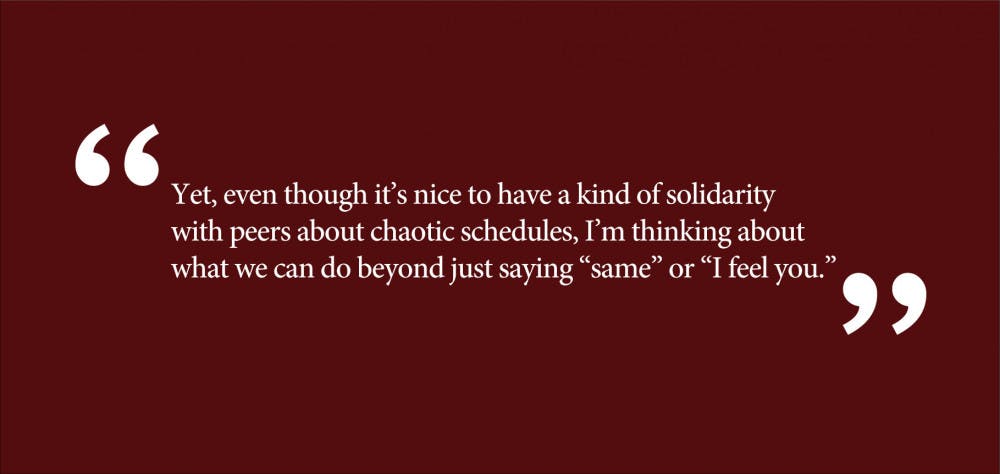There’s a saying at Brown: it’s midterms season until it’s finals season. And while this may seem like an exaggeration for comedic value, it’s much closer to reality than one might think.
Regardless, it remains completely true that Brown students are busy. I have observed that students at Brown are open about their work-related stress; they are comfortable letting people know when things are getting hectic. I think this honesty is great, and I appreciate the authenticity of the Brown student body.
Yet, even though it’s nice to have a kind of solidarity with peers about chaotic schedules, I’m thinking about what we can do beyond just saying “same” or “I feel you.” How do we support and show up for each other when we’re all going through it? This question is worth exploring and doing so will prove to be in everyone’s best interest.
It’s safe to say that everyone experiences times of heightened stress, anxiety or fatigue. While we accept these ‘ruts’ as a part of college life, feeling this way for a prolonged time period demands more serious attention. Burnout is a legitimate concern for high-achievers, the kind of students Brown attracts. The stress of multiple exams in a week, a paper here, a project there, and other challenges that seem to always arise at the worst time can ultimately lead us to a point where we completely shut down.
Knowing this, we do what we can to avoid that point. As I mentioned earlier, solidarity is a common way I’ve seen Brown students try to support peers during trying times. However, in a 2018 column, Chanel Johnson ’20 warned us about the potential consequences of this method, citing specifically its ability to exacerbate existing exhaustion. With this in mind, we should reconsider what it means to be supportive.
Lending an open ear is another common way we offer support. But not everyone is equally likely to talk about their struggles, and not everyone has the bandwidth to listen to others all the time. Society informs how we move through the world, for better or worse.
Men, for example, are traditionally not socialized to open up and be vulnerable. So while the tendency to address burnout through conversation can be helpful, this tactic risks leaving some men behind, for whom talking about their feelings would be a departure from the norm. The rigid nature of conventional masculinity impacts men’s ability to support others and their willingness to seek help when they need it.
Conversely, the expectation of managing others’ feelings and listening to their problems largely falls on women. This is a manifestation of how women are socialized. In a 2018 New York Times article, Kristin Wong illuminates this dynamic; she uses the term “emotional labor,” which encompasses the psychological duties expected of women that go largely unnoticed. One example of emotional labor is “surface acting,” when the emotions one displays, such as empathy, do not match their true feelings. This disparity has tangible effects; Wong cites the American Psychological Association’s yearly findings that women consistently report higher stress levels.
Even when men do subvert gender norms and reach out for emotional help, they can in fact reinforce harmful dynamics. It can be all too easy for men to demand emotional labor from women without intending to do so.
With all of this in mind, it’s important to think critically about how we can best support the people we care about — and to acknowledge that proper care can look different for everyone. One thing that might not come to mind immediately but is incredibly important is self-care. In her September 2018 column, Rebecca Okin ’19 implored us to devise self-care strategies that can actually recharge our batteries.
By striking a balance between self-care and mutual support, we can be conscientious of others’ emotional needs while simultaneously preventing the perpetuation of destructive societal norms. Collectively working to rejuvenate ourselves will not only ease our own stress and anxiety, but will also allow us to be there for our friends without it contributing to our own burnout.
Quentin Thomas ’21 can be reached at quentin_thomas@brown.edu. Please send responses to this opinion to letters@browndailyherald.com and op-eds to opinions@browndailyherald.com.





